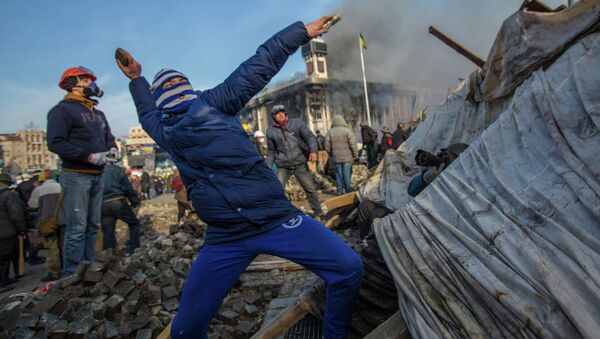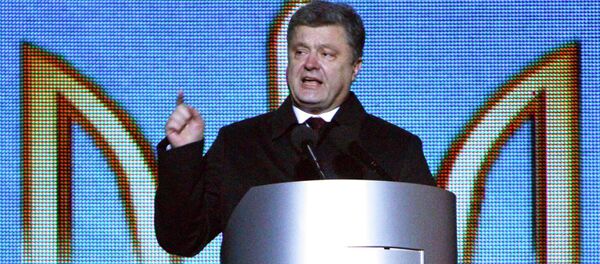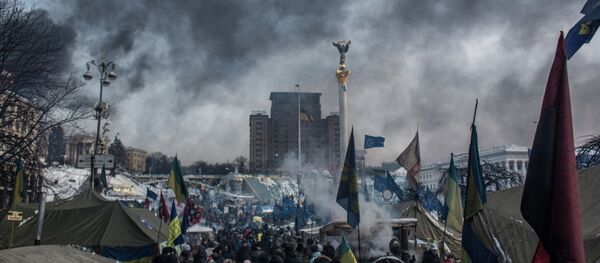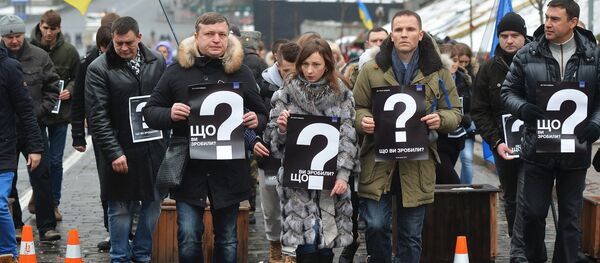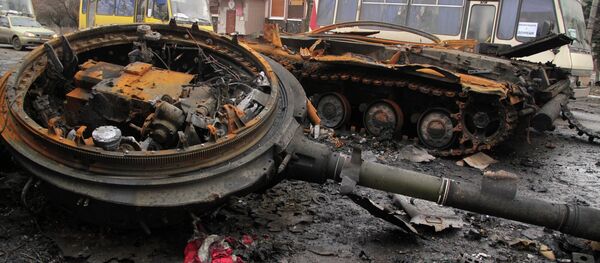Weeks of protests on central Kiev's Independence Square, or Maidan, resulted in ousting of President Viktor Yanukovych and a revolution, which brought pro-Western forces to power.
"The Maidan revolution and its consequences are surely an unmitigated man-made disaster," Vlad Sobell, a professor with New York University, Prague told Sputnik.
Sobell said that over the last 12 months, Ukraine has been "brought to its knees." "The economy is bankrupt, output is falling rapidly, the hryvnya [Ukrainian currency] has nosedived, the political system is once again paralyzed and the country is de-facto partitioned," the professor stated.
A year ago, many saw joining the European family as the most obvious way to ease their grievances, thus the suspension of the EU Association deal by Yanukovych faced fierce opposition.
Nicolai Petro, professor of international relations at the University of Rhode Island agreed that the expectation of the people who joined Maidan last year was that the removal of Yanukovych would lessen corruption and improve the overall quality of life.
According to Vlad Sobell, the Ukrainians have been "horribly exploited," as post-coup corruption remained rampant and could become even worse than it used to be under Yanukovich.
In the meantime, the West "will now engage in an orgy of asset stripping – taking what it wants of Ukraine's 'family silver' – under the pretext of the need for privatization," Sobell said.
HUMANITARIAN CATASTROPHE
Worse than the economic troubles Ukraine is currently facing, is the human tragedy. The United Nations estimated that Kiev's military operation against the self-proclaimed People's Republics of Donetsk and Luhansk claimed the lives of over 5,600 people, and wounded twice as many. But professor Vlad Sobell consider these figures to be a gross underestimation.
"German intelligence has put the figure at 50,000, which, I think, is probably still too little," Sobell said. "And of course there are huge numbers of people who have been maimed, traumatized for life and/or permanently displaced."
Nicolai Petro puts the ultimate question as "whether the parliamentary majority can muster the votes to deal with the crisis in the economy, constitutional reform, and military situation in the East."
DIVISIONS IN KIEV
Today's Ukrainian government represents an uneasy compromise among moderates, oligarchs, who backed Maidan to remove Yanukovych from power, and radicals who saw Maidan as a way to reinstate the Ukrainian nation on an ultra-nationalist basis.
The same is true about the actions of President Petro Poroshenko and of the parliament. The two centers of power cannot reconcile on some of the key issues, such as the constitutional reform, which would lead to Ukraine's federalization.
According to Petro, the possibility of new parliamentary elections is looming.
Vlad Sobell also warned that Kiev needs more pragmatism in decision-making. He noted that without a groundswell of opposition in Ukraine's parliament, dominated by a pro-EU coalition, the country is "headed towards neo-totalitarianism."
"The main planks of such a system are already in place: terror by unaccountable… far-right, in some cases openly neo-Nazi, groups, media propaganda and brainwashing, cover-up of true losses of the army and so on. It's up to the West to forestall such developments, but the chance that Brussels, Berlin or Washington will step in to do so are negligible", Vlad Sobell said.
On February 22, 2014, Ukrainian opposition activists seized the presidential administration building in Kiev, paving the way for a government, which in just weeks launched a deadly military offensive against its own people.
